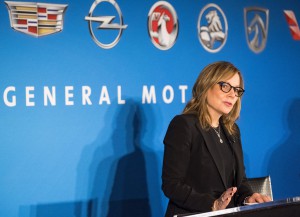
The Indian automotive market has mushroomed, but GM determined it wouldn't be profitable to remain there.
Long the global automotive leader, General Motors is ramping up its strategy of retrenchment, CEO Mary Barra ordering it to stop selling vehicles in both India and South Africa, as well as the countries in East Africa.
The early Thursday announcement follows earlier moves by Barra, who became the industry’s first female chief executive in January 2014. She pulled out of Russia a year ago and, in March of this year, announced that GM would sell off its long-troubled European Opel/Vauxhall operations to France’s PSA.
“As the industry continues to change, we are transforming our business, establishing GM as a more focused and disciplined company,” said GM Chairman and CEO Mary Barra. “We are committed to deploying capital to higher return initiatives that will enable us to lead in our core business and in the future of personal mobility”
The latest pullback would, at first blush, appear to violate two key auto industry doctrines:
- One posits that ever-increasing volume is essential, better economies of scale helping drive down costs, especially as manufacturers are required to add more and more high-tech content to their vehicles;
- The other asserts that the future of the auto industry can be found in the so-called BRIC markets, as well as other, fast-growing countries, such as Indonesia, Turkey and the Philippines.
There are few who argued with Barra’s decision to pull back from Russia, which has seen its car market all but collapse in recent years due to sanctions and the steep drop in oil prices, a primary source of the country’s income. Europe has been a financial black hole for GM since 1999, and the maker determined that it was unlikely to turn things around anytime soon, Brexit turning a forecasted profit into a sizable loss in 2016 – with the British separation from Europe expected to run up more losses this year.
(GM sale of Opel could take years to complete. Click Here to learn why.)
India, however, was another matter. With a population second only to China, many expected that it would eventually develop an equally massive demand for automobiles– China already the world’s largest car market.
But things have not developed nearly as quickly as anticipated, in part due to India’s chaotic politics, troubled economy, lack of automotive infrastructure – and another key reality. Unlike China, where there has long been strong demand for high-line products, Indian buyers are largely focused on the low end of the market, making it difficult to field vehicles that offer a realistic profit margin.
“We determined that the increased investment required for an extensive and flexible product portfolio would not deliver a leadership position or long-term profitability in the domestic market,” said Stefan Jacoby, the head of GM’s international operations.
In an unusual move, GM won’t pull out of India entirely, but simply stop selling cars there. The company will focus its GM India manufacturing operations on producing vehicles for foreign markets only, Jacoby noting that over just the past year, exports from those Indian plants have tripled.
(Ford cutting 10% of U.S., Asian workforce. Click Here for the latest.)
In South Africa, however, GM will pull out entirely, the company turning to an old Japanese ally to get the money-losing operation off its books. Isuzu will acquire GM’s light commercial vehicle manufacturing and GM will cease manufacturing and sales of Chevrolet in the domestic market, subject to local regulatory requirements.
“After a thorough assessment of our South African operations, we believe it is best for Isuzu to integrate our light commercial vehicle manufacturing operations into its African business,” said Jacoby. “We determined that continued or increased investment in manufacturing in South Africa would not provide GM the expected returns of other global investment opportunities.”
The irony is that GM weathered blistering criticism for maintaining its South African operations during the apartheid era.

While GM is pulling out of both Russia and India, Ford is holding pat, its Indian Figo model shown at a preview in Delhi a few years ago.
Isuzu also plans to purchase GM’s operations in East Africa. GM International will now streamline its regional headquarters office in Singapore, which will retain responsibility for strategic oversight of the remaining regional business and markets, including Australia, where GM is phasing out its manufacturing operations, and New Zealand, India, Korea and Southeast Asia.
Despite the announcement, GM might yet have some minor presence in South Africa. It will continue to provide service and support to existing Chevrolet and Opel vehicle owners. And it says it will work with PSA to study future opportunities there for the Opel brand. GM and PSA currently have a series of joint ventures underway and some observers speculate the ties between the two companies could grow in the years to come.
(PSA laying out plans for 3-stage return to U.S. market. Click Here for the story.)
Could a merger or some sort of tie-up with PSA – possibly along the lines of the Renault-Nissan Alliance — ultimately take shape? Perhaps, though it is not something that either company is currently talking about. But it would be the only way, it now seems, for GM to reposition itself as one of the global automotive leaders, at least based on sales. It slipped to third last year, behind both Volkswagen and Toyota, and with the sale of Opel and the new retrenchments, it will likely drop several more notches, sales dipping to somewhere around the 8 million mark.
(Joe Szczesny contributed to this report.)

